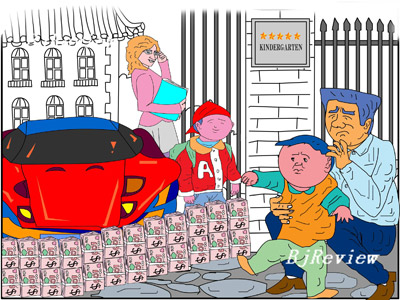
The trend in China of children competing for a limited pool of quality education resources has gradually spread from older students down to the preschoolers. It's a signal that parents are recognizing the significance of early childhood education and buying into the adage that "the more you invest now, the more you get repaid in the future." As a result, there are a growing number of opportunities for kindergartens to leap onto this lucrative bandwagon.
Last November, a foreign language kindergarten, called Henghai, opened its doors in Nanjing City, east China's Jiangsu Province, charging the parents an astronomical 100,000 yuan per child each year.
For this price, Henghai provides imported large-scale toys, an open-air play ground, a basketball court; computer lab, multifunctional hall, piano room and a mini art studio. The kindergarten positions itself as a high-end institution of preschool learning. The facilities are environment friendly and human-oriented, and all teaching materials, games and software are imported from overseas. In addition, children get their own wooden closet. It's clearly a five-star affair for these infants.
Ten days after its opening, more than a dozen children had registered for Henghai's full-day program in three classes, enjoying certified foreign teachers in an accelerated learning ratio of one teacher to one child. Aiming to provide an environment conducive to foreign language study, all foreign teachers are from countries with English as the mother language. Even the nurses are English-majored Chinese.
Amid the arousing controversy from the public, the founder of this luxurious kindergarten argued that the program is tailored to meet the needs of high-end customers like foreigners living or working in China and wealthy Chinese people including self-employed entrepreneurs. The bottom line is their target group is parents who prefer Western-style education and who have no qualm in paying the price.
Local education officials responded prudently, saying that Henghai is a private entity, thus it is entitled to price independently without interference from the government.
Over the years, China's preschool education has long been underestimated in terms of value, for the reason that it has been regarded as a welfare program. Since the late 1990s, the government has regulated various preschool programs, requiring payment to base on both quality and the category of the individual program. Meanwhile, the state encourages more private investment in the sector to strengthen early education development.
Kindergarten fees are, meanwhile, on the rise.
In Beijing, an average kindergarten costs 700-800 yuan per child each month. Full-time schools charge more. Between January-November last year, the per-capita disposal income for Beijing citizens reached 18,344 yuan, increasing by 13.6 percent year on year. The annual revenue is estimated at 20,000 yuan, according to authoritative figures. In a family where only one parent works, the education expenditure of a preschool child will occupy more than half of their total income.
At present, about 60 percent of ordinary Chinese families cannot afford regular early childhood education programs, said Zhu Jiaxiong, Vice Chairman of the China National Society of Early Childhood Education. He attributed this to the overpricing of private schools and the absence of public education resources available. In particular, in remote and rural areas, the situation can be much worse.
To survive in today's market, most private kindergartens are desperate to attract more children by offering a better learning environment and higher-level education resources than their counterparts. But all of these demand large capital investment, which will no doubt be filtered down to the fees paid by parents.
Some argue that the sky-high tuition fees and luxurious surroundings do not guarantee that children will either be more talented or better students. In fact, say these doubters, the sumptuous conditions could spoil the children, and breed laziness and vanity.
| 